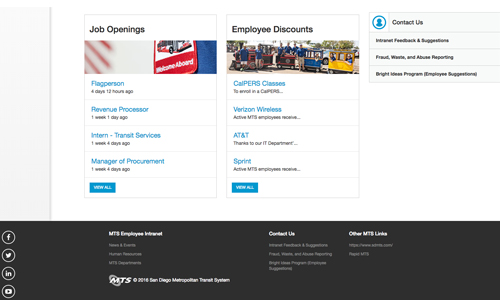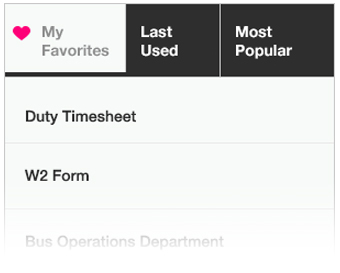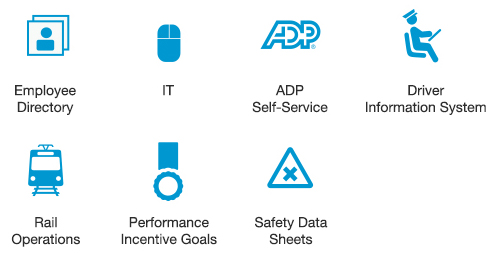You are here
Risk & Claims
From L to R: MTS Manager of Risk & Claims Susan Lockwood, Risk Management Specialist Eileen Dimagiba, Workers’ Compensation Analyst Amy Liebengood, and Liability Claims Supervisor Mark Held | Risk Management Specialist Eileen Dimagiba (right) hands off the latest claims to Liability Claims Supervisor Mark Held
MTS Risk & Claims Department employees are responsible for protecting the agency’s most important assets, our property and our employees. The team handles this responsibility through four primary means, (1) Insurance Placements , (2) Risk Transfers , (3) Liability Claims, and (4) the Workers’ Compensation Program.
To get the job done, Susan Lockwood, MTS Manager of Risk & Claims, leads a team of three employees. She has overseen the department since 2011. “It’s a great, small group. There’s no strife. We all have different personalities, but we come together well as a team.”
Here’s a breakdown of the team’s four areas of responsibility:
1. Insurance Placements
Purchasing insurance policies help MTS protect itself from the risks of unforeseen accidents. “The transit industry has more exposure to risk than other industries be - cause we are in the businesses of moving people,” said Lockwood. “Lots of things can happen out there. We need steadfast insurance policies and a solid risk manage - ment program to protect our assets.” MTS’ general liability insurance policies add up to $75 million in coverage. We are currently spending approximately $1.6 million annually for that coverage above a $2 million selfinsured retention per incident. We also purchase insurance to protect MTS’ prop - erty and excess workers’ compensation.
2. Risk Transfers
In addition to making sure our insur - ance policies are top notch, Risk & Claims is responsible for risk transfers. This is when the risk of work is appro - priately “transferred” to our contractors such as First Transit and Transdev for bus operations, or Allied Universal for security officers. “People who want to work with us need to be willing to take on the risk,” added Lockwood. “These transfers help protect MTS from liability that is outside our control.”
3. Liability Claims
When a person claims wrong-doing by MTS, a claim is filed with Liability Claims Supervisor Mark Held who has been with MTS since 2007. Held handles about 300 cases at any given time.
Helping Held with the caseload is Risk Management Specialist Eileen Dimag - iba, who’s been with MTS for 6 years. She provides support for all corners of Risk & Claims, but incoming cas - es can dictate her hours working on liability claims. “Every day we need to prioritize what needs to be done,” added Dimagiba.
- Most common cases :
- √ Bus vs. auto fender benders
- √ Passengers falling down during stops or starts
- √ Doors coming into contact with passengers
Each morning she examines incoming MTS Bus Operations Daily Activity Reports and begins the process of data entry to set up new claims.
“When people file claims against MTS, I want to show compassion and let them know I care about their well-being,” said Held. “The person is claiming a negative experience on our system and it doesn’t help to compound that by being defensive.”
According to Held, a big help to MTS’ Liability Program is our expanded use of security cameras. “The cameras don’t lie,” he added. In total, MTS has more than 10,000 cameras throughout the system. Held can pull video from any camera to help determine our level of liability when someone files a claim against MTS.
4. Workers’ Compensation Program
Exposure to risk is not just limited to passengers and the public. It extends to MTS employees as well. The nature of the transit business is inherently physical. It involves working with moving, heavy equipment. As such, MTS had 127 new workers’ compensation claims opened in 2017, or approximately 8.5% of the workforce. The Workers’ Compensation Program is a form of wage and medical benefits to employees injured on the job. Amy Liebengood, MTS Workers’ Compensation Analyst helps employees through the recovery process and also helps the agency find ways to prevent future injuries.
“There are a lot of moving parts that need immediate attention when an employee gets injured on the job,” said Leibengood. “I help guide employees through the process.” One of the most successful elements of Workers’ Compensation is the Return to Work Program (RTW) – a modified duty program for injured employees. “The RTW program provides an opportunity to provide meaningful work within the injured employee’s physical capabilities, and offers a bridge back to an employee’s usual and customary position,” added Leibengood. This includes part-time work such as clerking in the Transit Store, working as ambassadors for special events, restocking tool cribs, or working in the Store Room. MTS had 62 RTW employees in 2017 – 35 from MTS Bus and 27 from MTS Rail.
The information Leibengood obtains from employees injured on the job doesn’t just sit in a file drawer. She uses the information to improve working conditions. “We are always looking at preventing another injury,” she said. “We analyze every injury that happens and see what we can do to make sure it doesn’t happen again. This isn’t just an opportunity to help the employee recover. We try to help the agency recover too.” This process has included removing trip hazards from our property and adding safety training classes.

 Employee Directory
Employee Directory IT Help Desk
IT Help Desk ADP Self-Service
ADP Self-Service Driver Information System
Driver Information System Bus Operations
Bus Operations Rail Operations
Rail Operations Performance Incentive Program
Performance Incentive Program Safety Data Sheets
Safety Data Sheets





